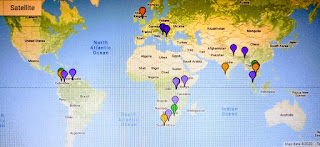Joining Advocacy Network Africa-AdNetA's AIDS 2020; Virtual Conference
AIDS
2020 Virtual Conference Planning Meeting Outcomes
I hope this finds you well.
We need to organise ourselves into a committee of
three persons who would then design the best approach to conducting the AIDS
2020; Virtual Conference Event.
The committee Members: Wasswa, Sulah and Tom.
There is need to have the communications team to
provide helping hands as we need to rearrange the venue to suit the event.
We anticipate that from 7:00 pm-8:00 pm on 29th June
2020 to 15th July 2020, we shall set aside time to make
presentations which will be recorded and disseminated thereafter. So, we need to find time to make rehearsals
as well as make required preparations. We need to identify the needs; resources
and persons to do particular roles.
Summary
Activities:
1.
Establish the “Refugees Organised
Against AIDS (ROAA) space
2.
Draw a schedule
3.
Identify roles, responsibilities and
persons to perform the roles
4.
Identify the abstracts to be presented
on the different days during the AIDS 2020; Virtual Conference
5. Come up with activities to fill up the
days from 13th June-15th July; record the activities and
disseminate them.
6.
Record/film short activities when
committee is presenting all abstracts as a panel. The videos should not exceed
3 minutes.
7.
Arrange venue
8.
Establish activity time to align with
AIDS 2020 Conference hours
We hope the broad and activity plans below can be used
as guidance:
TITLE: AIDS 2020; Virtual Conference
THEME: “Refugees Organised Against AIDS”
OBJECTIVE:
-Design/formulate an activity plan frame in which preparation
activities are shown:
|
The Script or Broad
Plan:
TITLE: AIDS 2020;
Virtual Conference
Self-introduction: Tom,
Sulah and Wasswa
AIDS 2020; Virtual
Conference and refugees
This is a short account
showing how refugees living in Nairobi and immediate environs have engaged in cultural
and social activities to contribute to self and the development of their
immediate communities.
1.
Formed self-help organisations to lobby
support for refugees and this in turn led to provisions such as housing, food
and engaging in income earning labour. They are able to pay rent, taxes and for
subsidies.
2.
They are mobilised to engage in
community clean-up campaigns thereby contributing to a wider community hygiene
and healthy environment.
3.
They have been able to navigate, demand
and cause social services to address their needs. This means that local host
communities plan and provide inclusive services catering to refugees and well
as citizens.
Community
Organising:
1.
Form CBOs which address specific issues
among refugees ranging from providing resource centre services to livelihood
activities
2.
Rent houses to be used as homes,
shelters, prayer places, retail shops, cottage industries and schools
3.
Most CBOs are also meeting venues for
refugees and through these known destinations planned services are made
available on demand
Case
Studies from Nature Network, Ganda Cultural Troupe, Advocacy Network Africa and
other organisations:
1.
LGBTIQQ Refugees needed a safe space to
access services. Nature Network CBO addresses specific issues among refugees
ranging from providing resource centre services to livelihood activities
2.
Rent several houses to be used as homes,
shelters, resource centre and a livelihood activities’ venue
3.
Nature Network CBO is also a meeting
venues for refugees and through these known destinations planned services are
made available on demand such as: care for those living with HIV/TB; provision of
public dialogue events to raise awareness on different issues; provision of IEC
on Universal Health Coverage; provision of detergents, soap, food and sanitiser
to prevent COVID-19 transmission; and setting up leadership incubation space
from where other organisations have been nurtured.
4.
Generating reports following
community-based activities such as mobilisation for: immunisation;
awareness-raising about different social-political issues; and rapport
building.
Sources:
Refugees collaborate with indigenous organisations
to promote Universal Health Coverage (UHC) Advocacy:
Refugees collaborate with indigenous organisations
to promote child well-being:
Refugees collaborate with indigenous organisations
to promote dignity for LGBTIQQ:
Distribution of food among refugees as an
Anti-COVID-19 response:
Refugee-led short film on homophobia wins Platinum
Award:
Profile of a refugee-leader:
Profile of some of the Refugee-led organisations: https://thenaturenetworkgroup.blogspot.com/2020/04/nature-network-profile.html
NB. We shall use Facebook Story Archive to show-case
more activities.
Videos:
We have shared videos
showing how refugees use film to raise awareness about issues such as: Health
campaigns; linking vulnerabilities to life and Tobacco; how communities can
address TB-related Stigma; Virtual World TB Day.
Conclusion:
This is work is part of
the Strategic Public Health Promotion, Awareness and Advocacy Campaigns of
which end to HIV, TB, Malaria by 2030 integrating COVID-19 response and
recovery are part. Refugees living in Nairobi and immediate environs have
engaged in grassroots work; engaged in cultural; and social activities to
contribute to self and the development of their immediate communities.
























Comments
Post a Comment